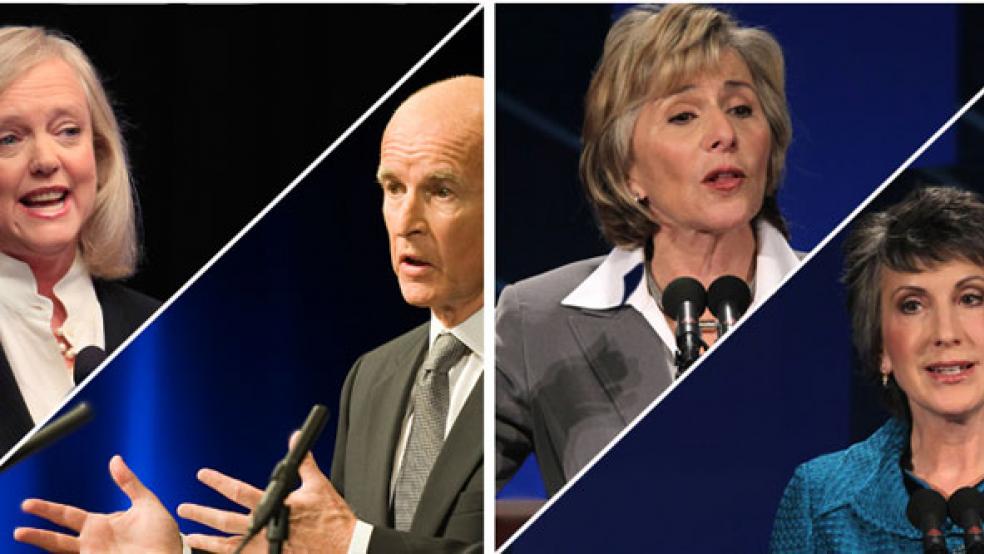SAN FRANCISCO – For an election that has all of the drama, the oddball characters and the campy flare of a Hollywood spectacle, the California midterm campaigns have generated a surprisingly tepid response here in the Bay Area.
Even with President Obama and former president Bill Clinton barnstorming the state and the airwaves clogged with combative campaign ads, voter response has been relatively muted. In discussions with diverse people from around the Bay, even those who say they normally get revved up for elections are paying scant attention to the two most crucial races for governor and the U.S. Senate.
The Politician vs. the Executive
Instead, Californians are witnessing a governor’s race in which issues have too often given way to personal snipes between an Internet billionaire so new to politics that she hasn’t voted for years and a former Democratic governor and current state attorney general who was once known as “Governor Moonbeam” for his New Age leanings. So far, the former governor, Jerry Brown, is leading in the polls, despite former eBay CEO Meg Whitman spending over $150 million of her own money to saturate the state with ads tailored to just about every conceivable interest group.
Republican Whitman’s failure so far to buy the election can be blamed in part on a bland campaign style and on her obfuscation over hiring an illegal immigrant as a housekeeper, liabilities that have been greater for her than Whitman’s indignant attacks on Brown, after an unidentified aide of his was caught on audio uttering the word “whore” to describe Whitman, were on Brown.
The two candidates are trying to articulate a difference between the experienced politician and the successful corporate executive in solving the state’s horrendous budget and unemployment problems. This argument sounds a lot like a rerun of the Arnold Schwarzenegger campaigns, in which the superhero actor and astute Hollywood businessman promised to do better than the politicians, but largely failed. The Whitman-Brown campaign might be more entertaining if California wasn’t reeling from an unemployment rate of over 12 percent – which economists here believe is unofficially more like 15 percent – and a slew of other problems, ranging from one of the highest foreclosure rates in the nation to a second-from-the-bottom national ranking of the number of adults who have at least a high school education.
The Senate Contest
For the Senate race, we’re looking at two sharp-edged candidates who are lashing out with increasingly vicious personal attacks. Fortunately for the three-term Democratic incumbent, Barbara Boxer, her challenger, the Silicon Valley executive Carly Fiorina, has proven to be unlikable enough to possibly lose an election that Republicans might have handily won with a stronger candidate.
Even Boxer’s liberal base is disenchanted with her lack of accomplishments in Washington. Yet she is proving to be a more adroit politician than her GOP challenger. Fiorina’s leaden, arrogant speaking style and her checkered career as the CEO of Hewlett-Packard have failed to catch fire, even if the polls place the race in a dead heat.
Ambivalence in the mostly liberal and Democratic Bay Area has shifted dramatically from the 2008 presidential election. Back then, fired-up crowds of young and old poured into the streets of San Francisco and other cities and towns, exhilarated by Obama’s presidential campaign. “I’m disappointed with Obama,” said Anthony Sandberg, 61, who owns and runs the OCSC sailing club in the East Bay. “He hasn’t kept up the energy. He was handed a pile of manure with the economy and the war, but he hasn’t inspired or engaged people on what they’re really worried about.”
“We lack leaders with visions and with a plan,” says Paul Saffo, a futurist who teaches at Stanford University, trying to explain his state’s malaise. “Someone will win, but few people think they will change anything.”
Other campaigns being followed by people in the Bay Area include a referendum to legalize marijuana, and another proposition paid for by out-of-state oil companies that would roll back the state’s landmark laws restricting carbon emissions. Marijuana may win, although the feds have vowed to enforce anti-cannabis national laws, and the pro-carbon measure is expected to fail.
Each of these classic California issues have their die-hards, but even these races have failed to arouse the excitement one might expect from a region that loves its herbs and hates “the man” – in this case, the out-of-state “oil man”.
At some point, if history is a guide, Californians will shake this off and get stoked again. There’s even a chance that in the few days remaining before the midterms, a fire will be lit for candidates or issues. It’s far more likely, however, that the Golden State will have to wait at least two more years to see if there is a leader out there able to jumpstart the California Dream.





